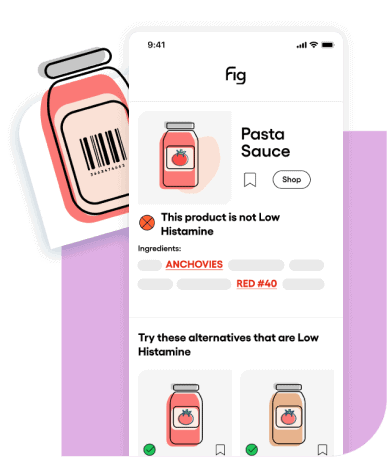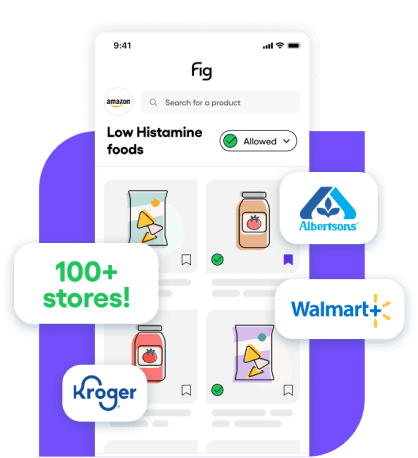Is pink lady apple high in histamine?
Pink Lady Apple is likely suitable for a low histamine diet. However, be especially careful with dried fruits which tend to contain preservatives like sulfur dioxide or sulfites. These can trigger reactions in some patients.
Every person has unique dietary triggers. Your reaction to pink lady apple may be different than someone else's. Test your individual tolerance to ingredients carefully and then keep track of them with the Fig app.

Stop Googling ingredients!
Check if ingredients like pink lady apple are histamine-friendly instantly with Fig. Scan a product's barcode and the Fig App will highlight ingredients that may be high in histamine. If a product isn't suitable, Fig will recommend low histamine alternatives.
Plan your low histamine shopping at home
When you avoid hundreds of ingredients, grocery shopping is a challenge. With Fig, you can search 100+ grocery stores for products that are likely low histamine. Instantly.
Since everyone's triggers are different, you can also customize Fig for your unique needs. Find food that works for you - it's free!


Just starting a Low Histamine diet?
The Low Histamine diet helps reduce symptoms from conditions like Histamine Intolerance (HIT) and Mast Cell Activation Syndrome (MCAS).
The diet is challenging to follow, as there are very few primary data sources available that accurately detail which ingredients are:
1.) High in histamine and other amines like tyramine
2.) Histamine liberators (ingredients that trigger release of the body's natural histamine)
3.) DAO blockers (ingredients that block DAO, the enzyme that breaks down histamine and other amines)
We've done our best to provide accurate information on the histamine content of pink lady apple; however, we suggest working with a dietitian to navigate the diet and understand your individual needs.
Keep in mind that multiple histamine food lists exist. Some of them are based on science, and some of them are based on patient experiences. Use these lists as a starting place for your own personalized list of food triggers. You know your body best!
Check the Fig app for the latest ingredient annotations. Other helpful resources include SIGHI and Histamine Intolerance Awareness UK.
Spot an error? Let us know at support@foodisgood.com.